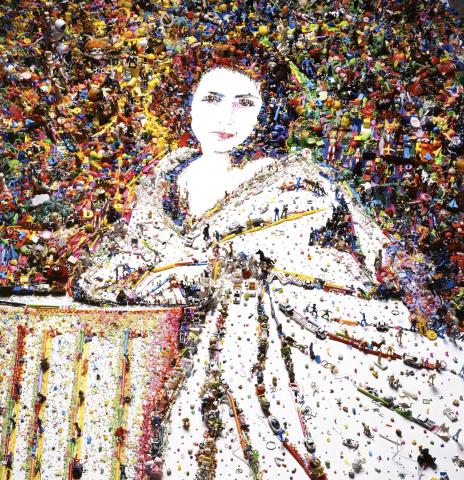
The programs are in conjunction with "Plastic Entanglements: Ecology, Aesthetics, Materials," an exhibition organized by the Palmer Museum of Art at Penn State, on view from September 22 to December 30, 2018.
EUGENE, Ore. -- (September 13, 2018) – The Jordan Schnitzer Museum of Art at the University of Oregon presents a full series of public programs designed to complement the exhibition "Plastic Entanglements: Ecology, Aesthetics, Materials," on view at the Jordan Schnitzer Museum of Art at the University of Oregon from September 22 – December 30, 2018. From lectures to student research presentations, the programs are free and open to the public.
The programs begin with a public preview on Friday, September 21 from 7-9 p.m. Explore the museum after hours and get a preview of “Plastic Entanglements” before it officially opens on Saturday, September 22.
On Wednesday, October 17, the Oregon Humanities Center presents the O’Fallon Lecturer in Art and American Culture with artist and activist, Dianna Cohen. Starting at 7:30 at 156 Straub Hall, Cohen, whose work is on view in “Plastic Entanglements,” presents a talk about the pervasive problem of plastic pollution.
On Wednesday, November 7, at 5:30 p.m., a panel of faculty and experts in different fields will share their perspectives in response to the themes of the exhibition and discuss the long-term effects of the plastics we consume in our own community. Babe O’Sullivan, from the Oregon Department of Environmental Quality and Materials Management Program, will moderate “Interdisciplinary Approaches to Plastics, Pollution, and Consumption.”
University of Oregon students present their research on Thursday, November 15 at 5 p.m. Students from several classes, including UO’s Political Science department's "Intergenerational Justice" course will share work related to some of the core themes raised by the “Plastic Entanglements” exhibition. Presentations may address the historical, sociological, legal, aesthetic, literary, scientific or philosophic dimensions of plastic, the material’s limitless potential benefits, and the threat plastic poses as a serious, potentially perpetual environmental curse.
On Wednesday, November 28, at 5:30 p.m., Matthew Northridge, whose work “Horizon” (2002, printed materials and acrylic hemispheres) is on view in “Plastic Entanglements, will present a survey of his work from 2002 to present, in an artist lecture, “Charting the Known Universe from Memory.”
Finally, families will get a chance to explore “Bringing the Outdoors Inside,” a free family day on Saturday, December 8 from noon to 3 p.m. Visitors will experience visual and performing arts focused on current exhibitions including “Plastic Entanglements.”
“Plastic Entanglements” presents an opportunity for local and regional audiences to reflect on the global implications of plastics consumption as well as its complex presence right here in our own community,” says McCosh Associate Curator Danielle Knapp. “The artwork on view and the public programs will expand visitors’ understanding about the plastic crisis and may even inspire a call to action.”
The exhibition features fifty-eight works exploring the complex story of plastic — from drawings and photographs to video installations and sculptures fabricated from found objects. “Plastic Entanglements” was organized by the Palmer Museum of Art at Pennsylvania State University and includes work by 30 emerging and mid-career contemporary artists from around the globe, such as Mark Dion, Marina Zurkow, Zanele Muholi, Vik Muniz, Jessica Stockholder, Chris Jordan, Brian Jungen, Aurora Robson, Willie Cole, Pinar Yoldas, Tejal Shah and Moreshin Allahyari.
"Plastic Entanglements: Ecology, Aesthetics, Materials" was originally curated by Joyce Robinson, curator at the Palmer Museum of Art; Jennifer Wagner-Lawlor, professor of women’s, gender, and sexuality studies and English at Penn State; and Heather Davis, independent scholar. Danielle Knapp, McCosh Associate Curator, and Cheryl Hartup, Associate Curator of Latin American Art, are overseeing the exhibition at the JSMA.
Following its installation at the Jordan Schnitzer Museum of Art, it will travel to the Smith College Museum of Art, February 8 – July 28, 2019 and the Chazen Museum of Art, University of Wisconsin-Madison, September 13, 2019 – January 5, 2020.
At the University of Oregon, “Plastic Entanglements” is made possible with the generous support of the City of Eugene; Lane County Waste Management Division; the Coeta and Donald Barker Changing Exhibitions Endowment; Arlene Schnitzer and Jordan Schnitzer; the Oregon Arts Commission and the National Endowment for the Arts, a federal agency; and JSMA members.
About the Jordan Schnitzer Museum of Art
The University of Oregon's Jordan Schnitzer Museum of Art is a premier Pacific Northwest museum for exhibitions and collections of historic and contemporary art. The mission of the museum is to enhance the University of Oregon’s academic mission and to further the appreciation and enjoyment of the visual arts for the general public. The JSMA features significant collections galleries devoted to art from China, Japan, Korea, Europe, and the Americas as well as changing special exhibition galleries. The JSMA is one of seven museums—and the only academic art museum-- in Oregon accredited by the American Alliance of Museums.
The Jordan Schnitzer Museum of Art is located on the University of Oregon campus at 1430 Johnson Lane. Museum hours are 11 a.m. to 8 p.m. Wednesdays, and 11 a.m. to 5 p.m. Thursdays through Sundays. Admission is $5 for adults and $3 for senior citizens. Free admission is given to ages 18 and under, JSMA members, college students with ID, and University of Oregon faculty, staff and students. For information, contact the JSMA, 541-346-3027.
Contact: Debbie Williamson Smith, 541-346-0942, debbiews@uoregon.edu
Links: Jordan Schnitzer Museum of Art, http://jsma.uoregon.edu





